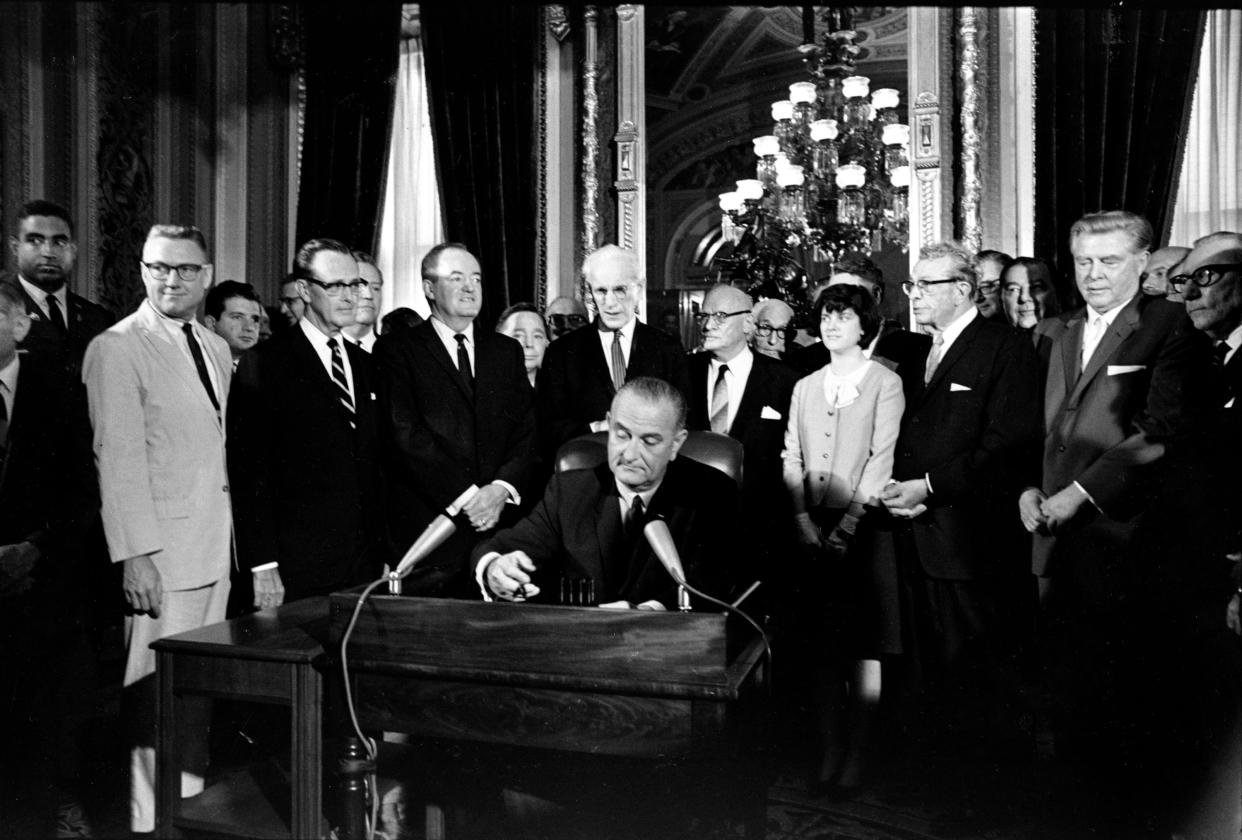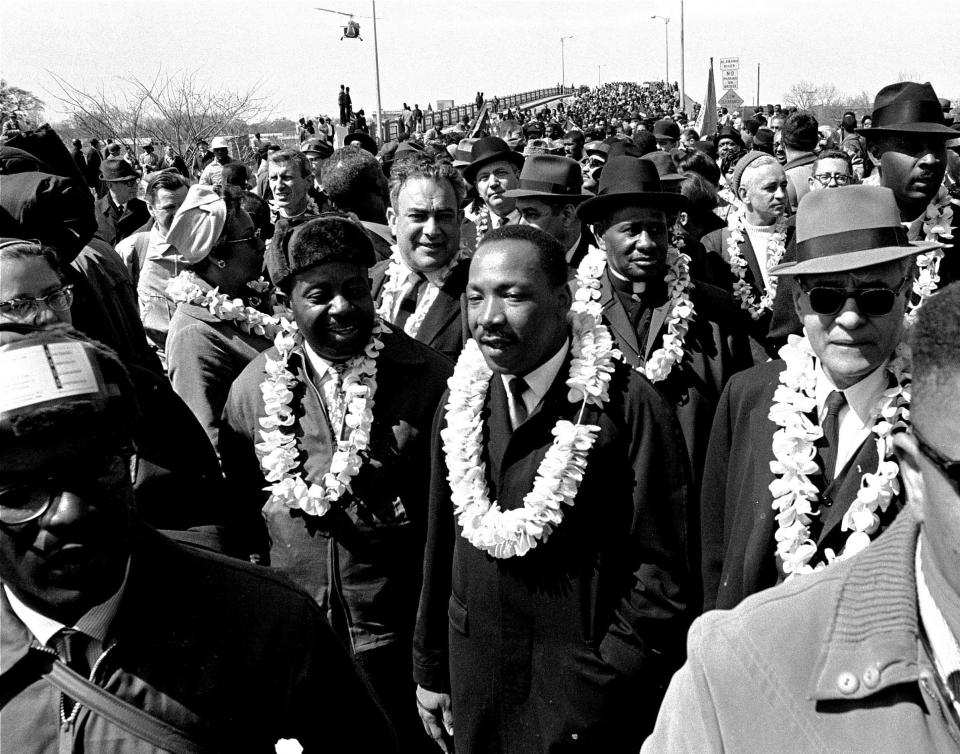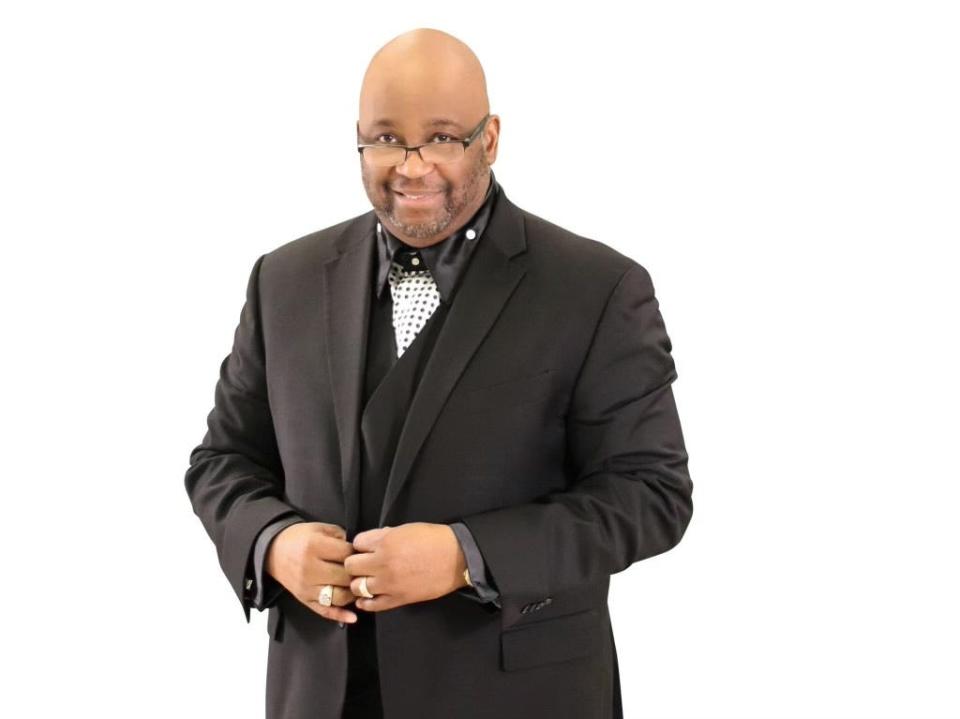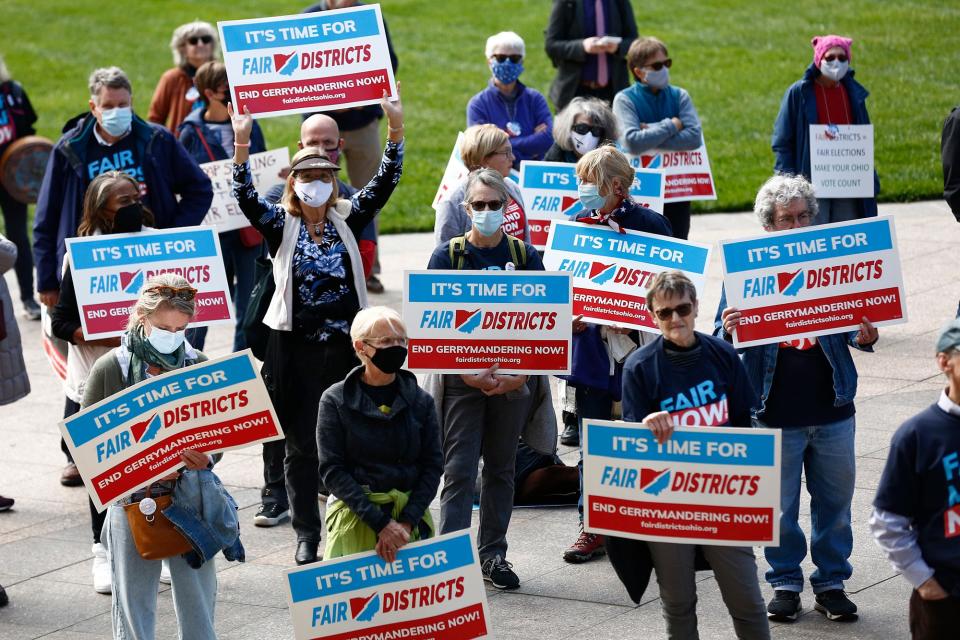57 years after Voting Rights Act, 'we’re still fighting'| Opinion

- Oops!Something went wrong.Please try again later.
Rev. Michael Harrison is senior pastor of Union Baptist Church in Youngstown. He also serves as president of the Ohio Baptist State Convention and board chair of the Ohio Organizing Collaborative.
This Saturday, marks the 57th anniversary of President Lyndon B. Johnson signing the Voting Rights Act into law. With the stroke of a pen, the United States moved closer toward achieving the promise of a fully realized democracy by extending the franchise to Black Americans.
The act was the result of the tireless efforts of countless civil rights activists, including Dr. Martin Luther King Jr. and Congressman John Lewis, whose voices rang loud enough to inspire an entire nation to change itself for the better and to strive for a democracy in which each voter’s voice is heard independent of the color of their skin or where they live.
But true progress never comes without setbacks, and now, nearly 60 years after the law’s passage, the voices of voters in our state and across the country are still being silenced.
More: Ohio is part of a shameful trend to erect barriers to voting in America
The fight for a better Ohio is not yet over. That’s why on Saturday at 1 p.m., hundreds of everyday Ohioans are joining together outside of the Statehouse to protect our freedom to vote and our fundamental right to fair representation. We invite you to join us.
No matter our color, creed, background, or zip code, we can all agree that it should be voters who pick the leaders in our state, not the other way around.

I’m a pastor in Youngstown and I can tell you that nobody knows the needs of our community better than the folks who live here. The same goes for all the communities in every last corner of our state.
Politicians shouldn’t be able to tilt elections in their own favor, yet that’s precisely what’s been happening here for more than a decade. Ohio lawmakers drew up unfair voting districts in 2011 that favored the majority party and they did the same exact thing in 2021, rejecting court orders, complaints from their constituents, and any standard of fairness.
More: Redistricting: Federal lawsuit says Ohio maps dilute Black voters' say
These manipulated maps are how politicians have divided our communities and silenced the voices of voters for their own political gain. They use these unfair maps to split apart neighborhoods, especially majority-Black communities, as a way to water down the area’s political representation, causing voters there to have less power.
The damage done by these manipulated maps can’t be overstated. And to understand why, you first have to know that the voting districts created by these electoral maps don’t just decide which political candidate gets to go to Columbus. They’re so much more.

More: How to submit guest opinion columns to the Columbus Dispatch
Our voting districts determine the allocation of key funding for hospitals, schools, public transport, broadband internet and other essential services.
Fair districts are also critical to guaranteeing that the voices of Ohioans are heard. Unfair districts are the ultimate job security for unpopular politicians who are now free to ignore the needs of their constituents. That’s why issues like providing a fair minimum wage, funding our public schools, and truly keeping our communities safe continue to gather cobwebs in our political discourse.
More: Opinion: Congress must pass voting rights bill to prevent Republican gerrymandering
Elected officials should represent the interests of our communities – not those of their political party or big-money corporate donors.
The anniversary of the Voting Rights Act should be a wake-up for all Ohioans. Things won’t get better until people fight for it – the same way that civil rights activists fought so bravely to achieve the rights we have today.
The fight for voting rights didn’t stop with the Voting Rights Act. We’re still fighting it here and now. The decades following the law’s passage were a back-and-forth struggle to uphold the vision of a democracy for all in the face of endless attacks on voting rights and fair voting districts.

As a Baptist pastor, I can tell you that values like fairness, compassion, and honesty aren’t optional when you step inside a church. I can also tell you that a congregation is only as strong as the voices of the people within it. Just like parishioners in a congregation, every Ohioan suffers when the voices of our communities go ignored and the power of our votes is weakened.
Dishonest lawmakers have abused our trust and compassion in their effort to create unfair voting maps. We deserve better than these maps and it’s time that our elected officials actually delivered.
More: Barack Obama: 'Our democracy isn’t a given.' Voting right must be 'vigilantly' preserved, protected.
The truth is, if we want a democracy that includes every Ohioan, we need to do away with map manipulation for good. Ohioans want fair maps – nonpartisan maps that are drawn transparently and representative of voters. After all, it’s voters who should be at the heart of our electoral process, not politicians desperately seeking a partisan advantage to keep their jobs.
Progress is always a long, winding process. Our communities have been fighting for our basic freedoms, and we will keep fighting on Election Day and beyond.
Fair district maps are the least Ohioans deserve and would mark a major step in carrying on the legacy of the Voting Rights Act and those who fought for it.
Rev. Michael Harrison is senior pastor of Union Baptist Church in Youngstown. He also serves as president of the Ohio Baptist State Convention and board chair of the Ohio Organizing Collaborative.
This article originally appeared on The Columbus Dispatch: Opinion: Voting Rights Act reminds Ohioans that the fight is not over

